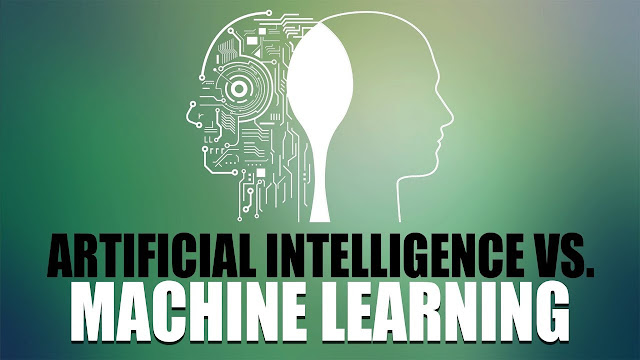Artificial Intelligence
Whenever Machine and Profound learning models comes into creation we call them Intelligent Specialists.
In this day and age we are encompassed by intelligent operators couple of cases of these specialists are Amazon Alexa ,Apple's Siri ,alright Google, and so on.
These intelligent specialists are prepared with the standards of Machine learning and later sent for creation.
So this is the essential contrast between every one of these points, or, you would now be able to call it as one theme with different subsets.
Machine Learning
As far back as PCs were made, there was dependably this inquiry would they be able to learn as people do ?
Well yes, in 21st century they can.
Machine Learning gains from the information which is given to it.
It tries to outline the examples between the info information and yield information with a specific end goal to learn.
Machine Learning requires loads of information to prepare.
Not at all like people, they can't undoubtedly recognize a rose and sunflower.
Machine Learning will require around a huge number of pictures of rose and sunflower to recognize them and contending in human level execution.
Barely any machine Learning cases in our everyday life are:
Checking whether sends are spam or not,Recommendation framework on shopping site like Amazon, Flipkart, Netflix and so forth…
Machine Learning — A Way to deal with Accomplish Artificial Intelligence
Machine Learning at its most fundamental is the act of utilizing calculations to parse information, gain from it, and after that make an assurance or expectation about something on the planet. So as opposed to hand-coding programming schedules with a particular arrangement of guidelines to achieve a specific undertaking, the machine is "prepared" utilizing a lot of information and calculations that enable it to figure out how to play out the errand.
Machine learning came straightforwardly from brains of the early AI swarm, and the algorithmic methodologies throughout the years included choice tree learning, inductive rationale programming. grouping, support learning, and Bayesian systems among others. As we probably am aware, none accomplished a definitive objective of General AI, and even Limited AI was for the most part distant with early machine learning approaches.
As it turned out, one of the absolute best application zones for machine learning for a long time was PC vision, however despite everything it required a lot of hand-coding to take care of business. Individuals would go in and compose hand-coded classifiers like edge identification channels so the program could distinguish where a protest began and halted; shape recognition to decide whether it had eight sides; a classifier to perceive the letters "S-T-O-P." From every one of those hand-coded classifiers they would create calculations to comprehend the picture and "learn" to decide if it was a stop sign.
Great, yet wouldn't fret bendingly awesome. Particularly on a foggy day when the sign isn't flawlessly obvious, or a tree darkens some portion of it. There's a reason PC vision and picture recognition didn't verge on equaling people until as of late, it was excessively weak and excessively inclined, making it impossible, making it impossible to mistake.
Artificial Intelligence — Human Intelligence Displayed by Machines
Back in that late spring of '56 meeting the fantasy of those AI pioneers was to build complex machines — empowered by rising PCs — that had similar attributes of human intelligence. This is the idea we consider as "General AI" — astounding machines that have every one of our faculties (possibly more), all our reason, and figure simply as we do. You've seen these machines perpetually in motion pictures as companion — C-3PO — and enemy — The Eliminator. General AI machines have stayed in the films and sci-fi books in light of current circumstances; we can't pull it off, in any event not yet.
What we can do falls into the idea of "Limit AI." Advances that can perform particular errands and also, or superior to anything, we people can. Cases of tight AI are things, for example, picture arrangement on an administration like Pinterest and face acknowledgment on Facebook.
Those are cases of Tight AI by and by. These innovations show a few features of human intelligence. In any case, how? Where does that intelligence originate from? That get us to the following circle, Machine Learning.
